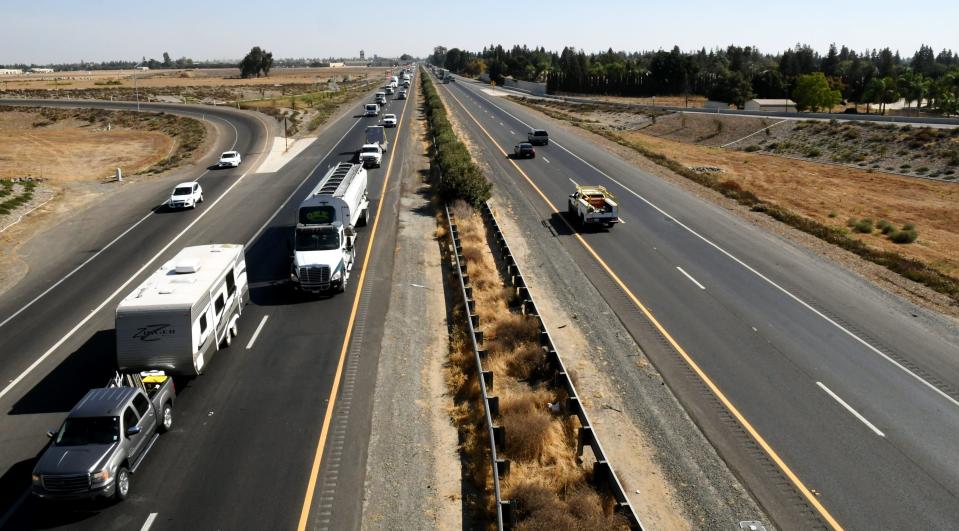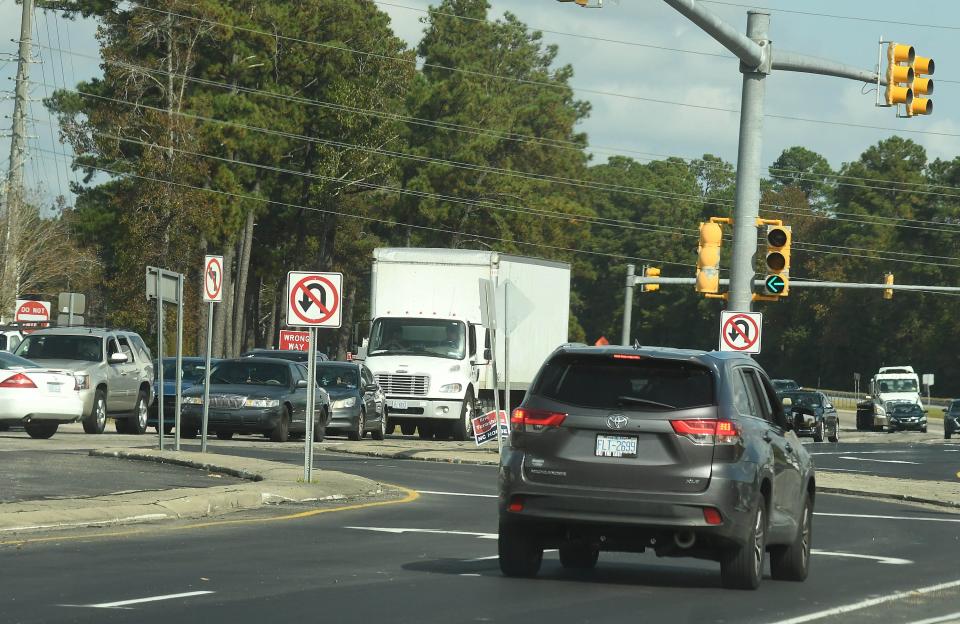Slow down! Your next speeding ticket in California may come thanks to a camera
- Oops!Something went wrong.Please try again later.
A newly proposed California bill could bring the use of automated speed enforcement cameras to cities across the state.
Assembly Bill 645 would authorize a pilot program in San Jose, San Francisco and Oakland, to install speed cameras on "priority safety corridors," which are defined as streets or highways that experience the highest number of fatal and severe traffic crashes.
Cameras would also be installed in school zones, high-injury streets, and streets with a history of racing and side shows.
“For too long, we have referred to most of these deaths as 'accidents' to sweep under the rug the uncomfortable truth: these deaths are preventable,” stated Assemblywoman Laura Friedman, (D-Burbank). “Slowing cars down is imperative to saving lives.”
Friedman co-authored the bill along with Assembly members Alex Lee and Marc Berman.
The pilot program would last until 2032.
Deadly consequences of speeding
Speeding accounts for nearly a third of all traffic fatalities, according to the National Transportation Safety Board. Most speeding-related collisions involve speeding passenger vehicles.
In California, traffic fatalities and serious injuries increased by 15.76% from 2020 to 2021. In 2021, 4,379 Californians lost their lives to traffic collisions—1,275 of whom were pedestrians and cyclists, according to California Office of Traffic Safety.
Speed increases crash-risk in two ways: it increases the likelihood of being involved in a crash, and it increases the severity of injuries sustained by all road users in a crash, according to NTSB.
A pedestrian struck at 20 miles per hour has a 90% chance of survival. That number drops to 20% if the car is traveling at 40 miles per hour, according to the National Highway Traffic and Safety Administration.

Will AB 645 infringe on privacy?
Opponents of the bill have raised privacy concerns.
"AB 645 subjects Californians to increased surveillance and perpetuates the false notion that this surveillance benefits the communities that are surveilled," National Motorist Association stated. "The need for enforcement of speed limits does not warrant the creation of a new mechanism for government collection of large amounts of data on Californians."
The association instead believes that alternatives like roundabouts and speed humps should be used to reduce speed-based traffic collisions.
However, AB 645 supporters argue that the speed camera system would be heavily regulated under each jurisdiction's digital privacy program.
Speed cameras are meant to capture images of the rear license plate of vehicles traveling 11 miles per hour or more over the posted speed limit. Speed camera images would be collected by cities and cannot be shared with any outside parties, according to the bill's text.
If a violation were issued, images would be kept for 60 days. Otherwise, cities would delete images after five days.
Additionally, AB 645 requires that speed safety system cameras be angled and focused to only capture photographs of speeding violations and not capture identifying images of other drivers, vehicles, or pedestrians.
Who pays for the camera system?
The recent Bipartisan Infrastructure Bill authorizes states to provide funding for speed cameras. Fees and fines collected from the system will also contribute to cost recovery.
While most speeding tickets can be costly, fines for a speed camera citation would start at $50. If a driver is unable to pay due to economic hardship, the bill includes an option for a fine reduction. Someone can also opt for community service instead of paying a fine.
Additionally, a citation would not result in a criminal violation.
The revenues from citations would cover the costs of other traffic calming measures such as speed feedback signs. The goal is to "change behavior," not collect fines, according to AB 645 advocates.
“AB 645 requires that cities use subsequent revenue toward engineering safer streets," Streets for Everyone Founder Damian Kevitt said. "After paying to administer the program, cities must spend the money on infrastructure to promote biking, walking, and slowing cars down."
The bill prohibits cities from shifting existing expenditures on traffic calming measures to backfill the revenue generated into their budget, Kevitt added.

How effective are speeding cameras?
Speed cameras have been proven effective at slowing drivers down, reducing collisions, and reducing fatalities. Cameras can reduce crashes on urban streets by 54%, according to the Federal Highway Administration.
In 2020, New York City deployed 750 speed cameras in school zones that were used from 6 a.m. to 10 p.m. on weekdays (as of August 2022 cameras are permitted to operate around the clock).
New York City officials discovered that intersections with speed cameras reduced speeding by an average of 73%, as of December 2021. Plus, speeding in school zones were reduced up to 63%.
What\'s next for AB 645?
The proposed bill passed the Senate Appropriations Committee and now moves to a vote before the full Senate.
If passed by the legislature and signed by Gov. Gavin Newsom, the program could begin as soon as January.
AB 645 is coauthored by Assembly members Miguel Santiago, Phil Ting, Mike Gipson, Mia Bonta, Buffy Wicks, Marc Berman, Matt Haney, Alex Lee, and Senators Scott Wiener and Henry Stern.
This article originally appeared on Victorville Daily Press: Your next speeding ticket in California may come thanks to a camera

